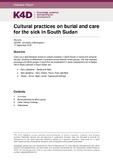Cultural Practices on Burial and Care for the Sick in South Sudan
Abstract
Literature on cultural practices for burial and care for the sick among individual ethnic groups in South Sudan was very limited. However, it clearly points to the importance of proper burials among all ethnic groups: these typically entail washing the body of the deceased; it can take several days before burial takes place; and graves are often located within or close to family homesteads.
South Sudan is incredibly diverse with over 60 different ethnic groups, within each of which there are further subdivisions. The largest ethnic group, the Dinka, for example, are divided into at least 25 ethnic sub-groups that each have their own distinct cultural practices, dialects and traditions (Cultural Atlas, n.d.). Given the exceptional diversity of the social landscape of South Sudan, it is perhaps not surprising that there is a dearth of literature on the cultural practices of individual ethnic groups. Moreover, much of the ethnographic literature on South Sudan dates back several decades, notably the work by renowned anthropologist E. Evans-Pritchard who died in the 1970s.
This review found some material on burial practices of different ethnic groups in South Sudan, but virtually no information on practices of caring for the sick. Overall, the literature highlights that proper burials in South Sudan are seen as critical both for the deceased and for the living. The majority of tribes in South Sudan practise either Christianity or syncretisms of Christianity and traditional African religion. Ancestors have a significant role in all ethnic groups. Graves are generally located within or close to family homesteads: they are important for maintaining connections with ancestors and family land, and increasingly, as proof of land ownership.
Citation
Idris, I. (2018) Cultural Practices on Burial and Care for the Sick in South Sudan, K4D Helpdesk Report 437. Brighton, UK: Institute of Development StudiesIs part of series
K4D Helpdesk Reports;437Rights holder
UK GovernmentCollections
- K4D [937]

